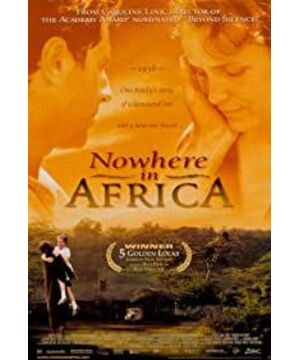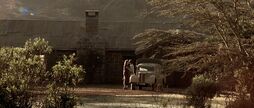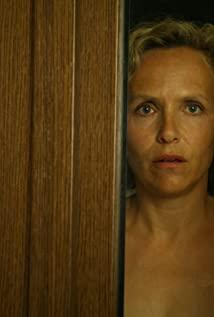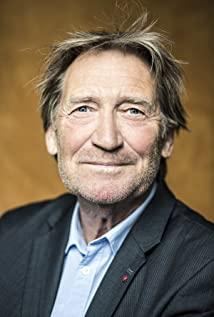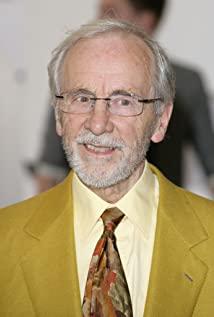It has been more than ten years since the film "Where is My Home" (NIRGENDWO IN AFRIKA) and won the Oscar for best foreign language film. I can feel the emotion and humanity of this film even more. For me, who is not chasing fashion, it can be regarded as a lost horse. By the way, "Hero", which I was very concerned about at the time, was nominated for the Oscar for Best Foreign Language Film. Now everyone knows that it ends with the nomination, and when you watch the German film "Where Is My Home", which has the last laugh, you will be able to really know why. I am afraid that when Zhang Yimou sees it, he will also sigh in the style of "both Sheng Yu and He Shengliang". The film is adapted from the German writer Stefanie Zweig)'s semi-autobiographical novel written in 1999, the director and novelist together became the screenwriter of the film. The two women's perspectives on the disaster brought by World War II to mankind are very unique. The plot is simple and restrained, which is an important factor for the success of the film. The beginning of the film is very exciting. The tropical wilderness of Kenya and the snow scene of Germany appear in the form of a montage, accompanied by the recollection of the protagonist Heijina. All the important characters appear, the protagonist Heijina, her mother Yeetel, her father Waite who fell ill with malaria in Kenya, her father's close friend Huskind, and the loyal chef Ober. The film tells the time span from 1938 to 1947. I think the biggest highlight of this film is that the three members of a Jewish family advance their own experiences over time, thus showing the changes in human nature. So, here's a brief overview of what the three have changed from the beginning to the end. Let's talk about Yettle first, I think she's the one who changed the most: The husband wrote that he needs a refrigerator, and if the box doesn't fit, throw away all the Rosenthal china, there's no need for it here. But she did not bring it, but brought carved porcelain, which was the opposite of her husband. It turned out that she used the money from the refrigerator to buy an evening dress. Before going to Kenya, the father-in-law Max asked her if she would stay with his son, and took her hand and said that he would promise him that the husband and wife would persevere to the end, and she nodded in response. There will always be someone who will give more love and that person will be vulnerable and my son loves you so much. Tell my husband we can't live here. She is short of water every day, eats no meat, and only eats eggs and corn paste. After seeing the wildfire, she said she couldn't take it anymore and wanted to leave. Says to Chef Ober, "Learn German if you want to talk to me", but then she learns the local language. When her husband said she would live with him in Nairobi, she refused to say that she would stay with Ober. She had been wanting to go elsewhere for the past few years, first to Germany, then to Rongai, she was always dissatisfied, but then she did not want to leave for Nairobi. Teach my daughter not to run around with black people, be careful they can get malaria and other diseases, they are dirty, white kids are not niggers, don't eat their stuff, and don't get into their huts. Her husband taught her that she had no right to live a luxurious life, and told her to stop thinking about being a young lady and face the reality. In the British "five-star" prison, she was taught by another woman that she should try to rescue her husband, and instead of complaining all the time, she could write to the Nairobi Jewish community to convince the British. After two weeks they were allowed to visit the man in the captive camp. Later, in order to exchange her husband for a job on the farm, she had to devote herself to a British soldier who knew German. Let's take a look at Waite: I always think his home is in Germany. he has always been Missing his dad, the Nazis forbid him to be a lawyer, confiscated his dad's hotel, and left his entire family facing unemployment. Why is this happening? Because they are Jewish. His father thought it would be over in a year or two. He kept persuading his family to leave as soon as possible, and he always hoped to become a lawyer as his father wished. At first, in the eyes of his wife, he was a wretch in Kenya. Although he had a job managing a cattle farm, he was no longer a lawyer. He also tried to hunt so that his family could eat meat. He later managed the farm and volunteered to join the army. In the end, he won the opportunity to return to Frankfurt, Germany to become a lawyer. His wife said he was an idealist, and he admitted and felt proud, because that means he still believes in human beings. I think this scene is the finishing touch of the whole film. Finally look at Heigina. She is the childhood archetype of the author of the original novel, the narrator of the film, and my favorite character in the film: In Germany, she was so afraid of other children and people that she didn't even dare to touch the hound, just holding the doll. But after she arrived in Rongai, Kenya, she got a duiker (the duiker was eaten by other high-level animals outside), and she also took the initiative to raise a homeless wild dog, saying that she was no longer afraid of dogs in Kenya. She remembered Germany as a dark place, not as bright and hot as Kenya, full of large buildings and gloomy rooms. Her German partner told her that black people always eat black things, otherwise raw, bloody things, and also eat dog meat and grasshoppers. In Kenya, I took the initiative to cater to the local life, and consciously took off my shoes and socks to feel the land barefoot. Later, when she moved to another place of residence, she sat on the roof and said it was the most beautiful place in the world. She is leaving her companions and going to an English school. Before leaving the farm to drive to school, she swore to her companions that she would go back during the holidays. There are also clear racial differences in schools, Jews do not have to pray (they think Jews killed the Son of God) and can eat whatever they want on Fridays. She doesn't like sports, at least not like that stupid game the British play. The eagle misses and the snake falls from the sky. This is her campus life. After returning home from vacation, because of the influence of her education, she thinks that she is no longer a child, she will not take off her shirt outside like before, and black people can't look at white people's breasts. But after talking to her black friend, she took off her shirt, exposed her chest, and climbed a tree with her friend. It echoes the previous her mother took off her shirt and learned to walk as a black woman. All this life in Kenya gave birth to Hegina, and even when she learned that the war was over and she could return to Germany, she was still deeply saddened. If she had to go back, she asked if she could go with Owa. There are excerpts from two scenes of touching dialogue. 1. I cried when the principal called Heijina to his office and questioned her: The principal: "Are you that Jewish girl?" Heijina nodded. Headmaster: "I can't hear you." Hegina: "Yes, I'm Jewish." Headmaster: "Tell me, are you really smart or do you have to be first?" Hegina: "What?" Principal: "I'm asking, why do you study so well." Heijina: "Because my family has no money." Principal: "Jews like to talk about money from time to time?" Heijina: "I don't know. My father has a monthly I earned 6 pounds, and I spent 5 pounds studying." Principal: "Ah! You even know these things." Heijina: "My dad told me." Principal: "Very good." Heijina: "My dad tells me everything. He also tells me that we can't waste money." Principal: "What did your dad do when he was in Germany?" Heijina: "He used to wear a black coat, but now He doesn't wear it anymore on the farm." Principal: "Do you like Kenya?" Hegina: "Yes, I like Africa and Owa very much." Headmaster: "Who is Owa?" Hegina: " Our chef, who has been taking care of us on the farm, knows we are Germans, but not Nazis." Principal: "Your parents will be delighted to see your transcripts, and your excellent composition." Heigina : "They can't read it unless I translate it into German first." Finally, the principal gave her a book to take home to read during the holidays. 2. The dialogue that Ober leaves is as follows: Heijina: Ober, pick me up again, just like when I first arrived at Rongai. Ober hugged Heijina like when he first saw Heijina, but this time she was a lot heavier. Heijina: Don't go, you don't really want to travel. Ober: Take good care of the master, he is still like a child. You're smart enough to help him out. Then Ober put Heijina down and set out on the journey with Ramler, the wild dog. Seeing this, I shed unbearable tears like Heijina. The film was shot on site in Kenya, conveying many local traditional cultures and natural landscapes, and the characters are vivid, just listed as follows: The large Acacia is an iconic evergreen tree in Africa. Carrying water is a woman's job, not a man. Ritual, slaughtering sheep, asking for rain from God Enga on Mount Kenya. Beggars on the road, peddling goods on their heads. According to the Poker tradition, dying people are carried outside the house, because if they die in the house, the house will not be clean. The tribe believes that the dead do not feel alone because their ancestors surround the dead. Coyotes would drag dead bodies at night. They believed that family sacrifices could purify it. Topless black woman on the farm. When Yettle told Ober you weren't afraid of your wife being lonely at home? He replied that women are helpless, but black women are different. He has 6 children, 3 wives, he gives them all the money he makes, and although only 12 shillings, they grow corn, beans and fish for a living. After Waite joined the army, Huskind drove Yettle for a ride one day, and he took her to Lake Bogonia, where the magnificent view of pink flamingos brought back happy memories for me. Although I went to Lake Nakuru National Park in 2011, the two lakes are actually very close, and there are also iconic animals such as flamingos. The lake system of the Great Rift Valley in Kenya, consisting of Lake Bogonia, Lake Nakuru and Lake Elementaita, was inscribed on the World Heritage List in 2011. Villagers celebrate, slaughter cows under the holy tree, sing, dance and drink. Wear long-sleeved clothes or even sweaters at night, because living on the plateau has a large temperature difference between day and night. Black children caught locusts and put them in their mouths and ate them alive. The scene of the farm working together to drive away the locusts is very exciting! It is also a very African thing to roast locusts after the fact. At the end of the film, a black woman sells bananas at the train stop, and Yettle says to her with a smile: "I can't buy anything, I'm as poor as a monkey." The seller then handed Yettle a banana and said: "Then give it to the monkey." The train drove away slowly, the seller didn't seem to sell a banana, but lost one, but she was smiling. Watching the train leave. The film carries a lot of information, and although some of them are not studied in depth, or even just swept away, as a film adapted from a novel, it has done a very good job. The film presents the entire storyline one by one through superb directing, acting, photography, editing, etc., and is full of epic temperament. It is well-deserved to win many awards. There are still some shortcomings, the most obvious is the visual inconsistency of the narrative. It's easier to see the loopholes at the level of monologues, where one scene even uses mother Yettle as a monologue: "Some words have lost their meaning here, like 'tax refund' or 'tram.' Sometimes I suspect grooming What's the point of dressing up, even if I wear a burlap sack, no one will care." The film looks at the changes of Jewish families from a human perspective, fitting the title of the film. They have no fixed home and have been fleeing. It is not easy to find a home, so that after getting used to life in Kenya, I don't want to leave, and I am afraid that there will be new encounters when I return to Germany. It takes courage to adapt to a new environment, because then you have to choose to lose what you have again, and then face the risks brought by the unknown. This is the epitome of the Jewish people. Their family has always been discriminated against, and the child who lived upstairs in Germany pretended not to talk to Jews. Not long after I met my husband in Kenya, the owner of the cattle farm scolded them in English as goddamn refugees. Swiss radio broadcasts the German Nazis burning down synagogues and occupying Jewish shops, destroying everything including people, houses and shops. I learned the news of the Yettle family in Germany through letters (each letter cannot exceed 20 words, only one can be written), the situation is getting worse and worse, and now I am going to work in Poland, and the Polish representative died. At least there was audio, and then even the letters stopped. Dad's victory in the army also brought bad news to the German family. Grandpa was beaten to death, Lisa (my dad's sister) was sent to a concentration camp, and no one came back alive. Dad asked his men to carve Grandpa's name on the big stone as a memory. The film also echoes the memory of her grandfather at the end, saying that her brother was born after they returned to Germany, and his name was Max, the same as her grandfather's name. It also represents a new hope, as the doomed Waite put it: As an idealist, I feel proud because that means I still believe in human beings. On the first day of the new year of Guisi, the China-Cameroon Friendship Building, Douala Akwa District, Cameroon The storylines are presented one by one in series, and they are full of epic temperament. It is well-deserved to have won many awards. There are still some shortcomings, the most obvious is the visual inconsistency of the narrative. It's easier to see the loopholes at the level of monologues, where one scene even uses mother Yettle as a monologue: "Some words have lost their meaning here, like 'tax refund' or 'tram.' Sometimes I suspect grooming What's the point of dressing up, even if I wear a burlap sack, no one will care." The film looks at the changes of Jewish families from a human perspective, fitting the title of the film. They have no fixed home and have been fleeing. It is not easy to find a home, so that after getting used to life in Kenya, I don't want to leave, and I am afraid that there will be new encounters when I return to Germany. It takes courage to adapt to a new environment, because then you have to choose to lose what you have again, and then face the risks brought by the unknown. This is the epitome of the Jewish people. Their family has always been discriminated against, and the child who lived upstairs in Germany pretended not to talk to Jews. Not long after I met my husband in Kenya, the owner of the cattle farm scolded them in English as goddamn refugees. Swiss radio broadcasts the German Nazis burning down synagogues and occupying Jewish shops, destroying everything including people, houses and shops. I learned the news of the Yettle family in Germany through letters (each letter cannot exceed 20 words, only one can be written), the situation is getting worse and worse, and now I am going to work in Poland, and the Polish representative died. At least there was audio, and then even the letters stopped. Dad's victory in the army also brought bad news to the German family. Grandpa was beaten to death, Lisa (my dad's sister) was sent to a concentration camp, and no one came back alive. Dad asked his men to carve Grandpa's name on the big stone as a memory. The film also echoes the memory of her grandfather at the end, saying that her brother was born after they returned to Germany, and his name was Max, the same as her grandfather's name. It also represents a new hope, as the doomed Waite put it: As an idealist, I feel proud because that means I still believe in human beings. On the first day of the new year of Guisi, the China-Cameroon Friendship Building, Douala Akwa District, Cameroon The storylines are presented one by one in series, and they are full of epic temperament. It is well-deserved to have won many awards. There are still some shortcomings, the most obvious is the visual inconsistency of the narrative. It's easier to see the loopholes at the level of monologues, where one scene even uses mother Yettle as a monologue: "Some words have lost their meaning here, like 'tax refund' or 'tram.' Sometimes I suspect grooming What's the point of dressing up, even if I wear a burlap sack, no one will care." The film looks at the changes of Jewish families from a human perspective, fitting the title of the film. They have no fixed home and have been fleeing. It is not easy to find a home, so that after getting used to life in Kenya, I don't want to leave, and I am afraid that there will be new encounters when I return to Germany. It takes courage to adapt to a new environment, because then you have to choose to lose what you have again, and then face the risks brought by the unknown. This is the epitome of the Jewish people. Their family has always been discriminated against, and the child who lived upstairs in Germany pretended not to talk to Jews. Not long after I met my husband in Kenya, the owner of the cattle farm scolded them in English as goddamn refugees. Swiss radio broadcasts the German Nazis burning down synagogues and occupying Jewish shops, destroying everything including people, houses and shops. I learned the news of the Yettle family in Germany through letters (each letter cannot exceed 20 words, only one can be written), the situation is getting worse and worse, and now I am going to work in Poland, and the Polish representative died. At least there was audio, and then even the letters stopped. Dad's victory in the army also brought bad news to the German family. Grandpa was beaten to death, Lisa (my dad's sister) was sent to a concentration camp, and no one came back alive. Dad asked his men to carve Grandpa's name on the big stone as a memory. The film also echoes the memory of her grandfather at the end, saying that her brother was born after they returned to Germany, and his name was Max, the same as her grandfather's name. It also represents a new hope, as the doomed Waite put it: As an idealist, I feel proud because that means I still believe in human beings. On the first day of the new year of Guisi, the China-Cameroon Friendship Building, Douala Akwa District, Cameroon Changes in people's families, fit the title of the film, they have no fixed home and have been fleeing. It is not easy to find a home, so that after getting used to life in Kenya, I don't want to leave, and I am afraid that there will be new encounters when I return to Germany. It takes courage to adapt to a new environment, because then you have to choose to lose what you have again, and then face the risks brought by the unknown. This is the epitome of the Jewish people. Their family has always been discriminated against, and the child who lived upstairs in Germany pretended not to talk to Jews. Not long after I met my husband in Kenya, the owner of the cattle farm scolded them in English as goddamn refugees. Swiss radio broadcasts the German Nazis burning down synagogues and occupying Jewish shops, destroying everything including people, houses and shops. I learned the news of the Yettle family in Germany through letters (each letter cannot exceed 20 words, only one can be written), the situation is getting worse and worse, and now I am going to work in Poland, and the Polish representative died. At least there was audio, and then even the letters stopped. Dad's victory in the army also brought bad news to the German family. Grandpa was beaten to death, Lisa (my dad's sister) was sent to a concentration camp, and no one came back alive. Dad asked his men to carve Grandpa's name on the big stone as a memory. The film also echoes the memory of her grandfather at the end, saying that her brother was born after they returned to Germany, and his name was Max, the same as her grandfather's name. It also represents a new hope, as the doomed Waite put it: As an idealist, I feel proud because that means I still believe in human beings. On the first day of the new year of Guisi, the China-Cameroon Friendship Building, Douala Akwa District, Cameroon Changes in people's families, fit the title of the film, they have no fixed home and have been fleeing. It is not easy to find a home, so that after getting used to life in Kenya, I don't want to leave, and I am afraid that there will be new encounters when I return to Germany. It takes courage to adapt to a new environment, because then you have to choose to lose what you have again, and then face the risks brought by the unknown. This is the epitome of the Jewish people. Their family has always been discriminated against, and the child who lived upstairs in Germany pretended not to talk to Jews. Not long after I met my husband in Kenya, the owner of the cattle farm scolded them in English as goddamn refugees. Swiss radio broadcasts the German Nazis burning down synagogues and occupying Jewish shops, destroying everything including people, houses and shops. I learned the news of the Yettle family in Germany through letters (each letter cannot exceed 20 words, only one can be written), the situation is getting worse and worse, and now I am going to work in Poland, and the Polish representative died. At least there was audio, and then even the letters stopped. Dad's victory in the army also brought bad news to the German family. Grandpa was beaten to death, Lisa (my dad's sister) was sent to a concentration camp, and no one came back alive. Dad asked his men to carve Grandpa's name on the big stone as a memory. The film also echoes the memory of her grandfather at the end, saying that her brother was born after they returned to Germany, and his name was Max, the same as her grandfather's name. It also represents a new hope, as the doomed Waite put it: As an idealist, I feel proud because that means I still believe in human beings. On the first day of the new year of Guisi, the China-Cameroon Friendship Building, Douala Akwa District, Cameroon Beaten to death, Lisa (Dad's sister) was sent to a concentration camp, and no one came back alive. Dad asked his men to carve Grandpa's name on the big stone as a memory. The film also echoes the memory of her grandfather at the end, saying that her brother was born after they returned to Germany, and his name was Max, the same as her grandfather's name. It also represents a new hope, as the doomed Waite put it: As an idealist, I feel proud because that means I still believe in human beings. On the first day of the new year of Guisi, the China-Cameroon Friendship Building, Douala Akwa District, Cameroon Beaten to death, Lisa (Dad's sister) was sent to a concentration camp, and no one came back alive. Dad asked his men to carve Grandpa's name on the big stone as a memory. The film also echoes the memory of her grandfather at the end, saying that her brother was born after they returned to Germany, and his name was Max, the same as her grandfather's name. It also represents a new hope, as the doomed Waite put it: As an idealist, I feel proud because that means I still believe in human beings. On the first day of the new year of Guisi, the China-Cameroon Friendship Building, Douala Akwa District, Cameroon
View more about Nowhere in Africa reviews


